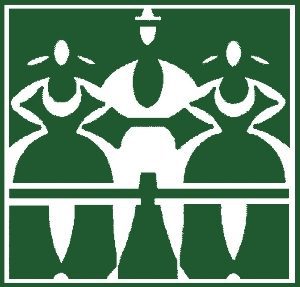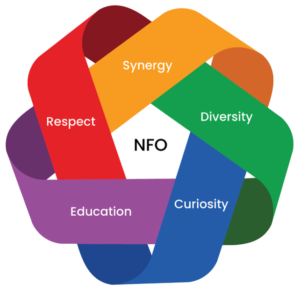
2025 NFO Conference Special Guests
April 2 – 6 in Portland, Oregon
Anthony Shay – Featured Speaker
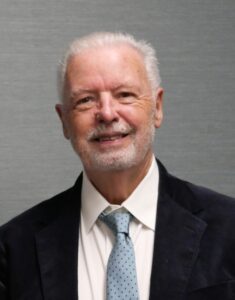
Dr. Anthony Shay (Tony), a renowned scholar, choreographer, and director, will deliver the keynote address at the upcoming NFO meeting in Portland this April. His presentation will focus on the profound influence of state-supported folk ensembles on the inception of the recreational folk dance movement in the United States and the development of staged folk dance groups across the country. Drawing on his deep expertise, Tony will illuminate the cultural and artistic connections between national ensembles and American folk dance practices.
As the former director of the celebrated AMAN Folk Ensemble (1963–1977) and the AVAZ International Dance Theatre (founded in 1977), Tony has significantly shaped the world of ethnic and folk dance performance. His career spans decades as a performer, choreographer, and teacher, alongside an accomplished academic career as a professor of theatre and dance at Pomona College. Tony holds a Ph.D. in dance history and theory from the University of California, Riverside, and has authored numerous influential works examining the intersection of dance, culture, and politics, particularly in Eastern Europe, the Middle East, and Central Asia.
Currently, Tony is editing the Palgrave Handbook of Folk Dance and Nationalism, a landmark anthology analyzing the history and impact of state-supported folk ensembles worldwide, set to be published in 2025 or 2026. This volume explores how these ensembles shaped cultural identities and political narratives during the Cold War era and beyond.
Tony’s keynote promises to offer unique insights and inspire lively discussion about the connections between global folk traditions and the American folk dance landscape. Attendees can look forward to an engaging and thought-provoking presentation.
Tom Bozigian & Sheree King
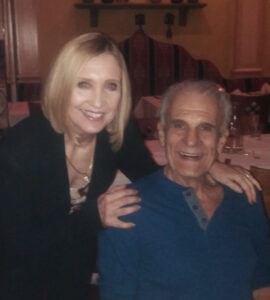
At the conference, Tom and Sheree will teach Armenian dances and present a Culture Session on “Learning, Teaching, Recording, and Preserving Armenian Dance and Culture,” sharing their invaluable insights and experiences.
Tom Bozigian and Sheree King bring a lifetime of dedication to Armenian dance, music, and culture. Tom, a California native of Armenian descent, grew up immersed in the traditions of the Armenian community in Fresno. With a Master’s degree in education and a Bachelor’s degree in Russian language, he pursued advanced training in Armenian folk dance, both in the United States and at prestigious schools in Armenia. His studies with master choreographer Jora Makarian and his time at the Yerevan Sayat Nova Choreographic School shaped his unparalleled expertise in Armenian dance, including pre-1915 repertoire.
Tom’s work as a choreographer, teacher, and musician has taken him worldwide, sharing the rich heritage of Armenian culture through solo, couple, line, and group dances. A skilled percussionist, he also leads a folklore orchestra and produces music recordings that celebrate the sounds of the Caucasus, Near East, and Balkans.
Sheree King, Tom’s wife and partner in dance, is a renowned choreographer and dancer with a distinguished career as the director of the Dance Department at Long Beach City College. A certified Pilates instructor since 1993, she has enriched her work with a deep understanding of movement and performance. Together, Tom and Sheree have carried forward the legacy of their mentor, Lois Ellyn, by leading the Nouveau Chamber Ballet and continuing to expand their Nutcracker productions with innovative choreography and artistry.
Stacy Rose
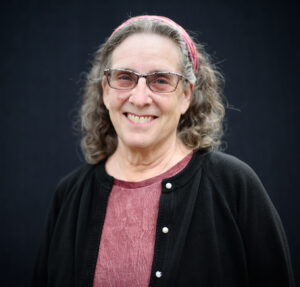
“Game On! Using Games to Enhance Folk Dance Learning”
At the conference, Stacy will lead an interactive presentation showcasing how game-based activities can enhance learning and engagement in folk dance. Drawing on her experience as a community college instructor, she will demonstrate the innovative ways she uses games modeled on popular television game shows—The Match Game, What’s My Line Dance, and Folk Dance Jeopardy—to review and reinforce dances with her students.
Conference participants will get to play these games firsthand, experiencing how this creative approach makes learning both effective and fun. Stacy’s session promises to be both educational and entertaining, offering practical tools for teachers and dance leaders to invigorate their own classes and events.
Stacy Rose is a passionate advocate for folk dancing and a dedicated educator. She began folk dancing in the early 1980s and expanded her repertoire in the early 2000s when she became a contra dance caller, sharing her love of dance at events around her state and beyond. Recognizing a need to revitalize her local folk dance community, Stacy began teaching a folk dance class at her community college in 2009. This effort not only kept the tradition alive but also inspired others to take up teaching folk dance themselves.
Stacy’s commitment to fostering new talent extends to her involvement with the National Folk Organization’s mentoring project. As a steering committee member and mentor to novice dance teachers, she helps nurture the next generation of folk dance leaders. She also co-facilitates “Dancing With Friends,” a weekly Zoom folk dance class, collaborating with skilled remote instructors to bring the joy of dance to a global audience.
William (Bill) H. Dentzel
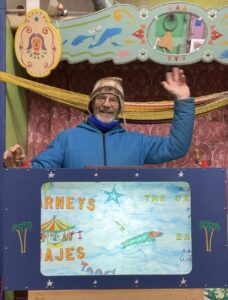
“Becoming a Fifth Generation Carousel Maker”
Bill Dentzel, a fifth-generation carousel maker, carries on a legacy that spans continents and centuries. Descended from Michel Dentzel, a German wagon and carousel maker, Bill represents a family tradition that began in the mid-1800s when Michel’s son Gustav brought his craftsmanship to Philadelphia, where the Dentzel carousel company thrived. This legacy passed down through generations, including Bill’s father, Edward Dentzel, who balanced a legal career with carving carousel pieces.
Bill’s passion for carousel making was ignited in the 1980s when he created a community carousel in a small Mexican village. Since then, he has built ten hand-powered carousels, restored numerous animals, and mastered the intricate skills of woodwork, mechanics, and decorative painting. A dedicated storyteller, Bill shares the rich history of carousels—dating back over 1,000 years in Asia and the Middle East—while blending tradition with artistry in his creations.
Sally Jenkins
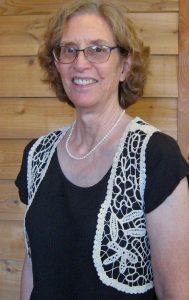
Sally Jenkins will deliver a presentation titled “Pourparler: A Sampler Platter”. This 30-minute session will include speaking, participatory activities, and a discussion on the Pourparler experience compared to other dance workshops, segueing into an explanation of the Archives.
Sally Jenkins, a passionate leader in the folk dance community, currently serves as President of the Eugene Folk Dancers. Her dedication has revitalized the group post-pandemic, updating teaching structures and bylaws to ensure a broad and inclusive dance repertoire. Sally’s connection to the history and evolution of folk dancing in Eugene, from its inception in 1950 to the present, underscores her commitment to preserving traditions while embracing innovation.
Chris Dart
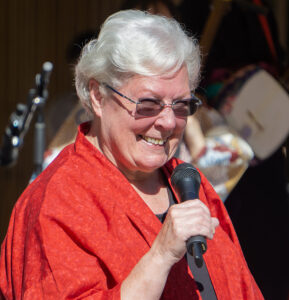
As the bon odori sensei at the Oregon Buddhist Temple, Chris Dart will guide participants through an Obon dance workshop, showcasing the joyful and inclusive spirit of bon odori. In addition, Chris will share insights into the history and cultural significance of Japanese dance forms, providing a brief exploration of the various styles that define this rich tradition. She will also delve into the stories behind the Japanese community in Portland and the history of Obon Dance, highlighting its role in connecting generations through remembrance and gratitude.
Chris Dart has been passionate about dance and music since her early years. Born in Vallejo, California, she moved to Portland, Oregon, in 1953. Her deep connection to Japanese culture began in 1959 when she started corresponding with her lifelong pen pal, Mioko, in Japan. This exchange sparked a lifelong fascination with Japanese traditions and culture, a bond that continues strong after 66 years.
In 1989, Chris attended her first Obon festival and bon odori (traditional Japanese folk dance) at the Portland Japanese Garden. The experience was transformative, leading her to immerse herself in the art of bon odori at the Oregon Buddhist Temple. Under the tutelage of Sahomi Tachibana, a master dancer of buyo and bon odori, Chris honed her skills and deepened her understanding of Japanese dance. Over the years, she transitioned from dancer to teacher, becoming the bon odori sensei at the Oregon Buddhist Temple in 2015 following Sahomi’s retirement.
Chris’s work extends beyond teaching. She has dedicated herself to preserving and expanding the tradition of bon odori, filming and documenting 71 dances taught by Sahomi Tachibana while also introducing new pieces to the repertoire. Her classes and performances at the Portland Japanese Garden and other community events embody her commitment to sharing the joy and cultural significance of bon odori with diverse audiences.
David Shochat
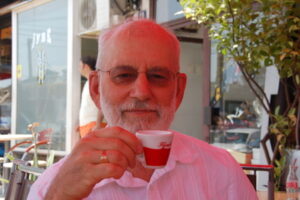
David Shochat was a performer with the AMAN Folk Ensemble (aka, AMAN International Music and Dance Company) of Los Angeles, California, and the AVAZ International Dance Theatre, both ensembles founded by Anthony Shay, where his specialty had been Balkan dances and music.
In 1963, when David was just starting to folk dance in California at the Pasadena Folk Dance Coop, David learned many international dances. He discovered Balkan Coop when it was forming, and instantly became head over heels in love with balkan music and dancing. David attended more balkan classes taught by Rubi Vučeta, Elsie Dunin, Atanas Kolarovski and others. He became a performer with AMAN, Sredec, Sobranie, and back to AMAN again.
In 1968, David began traveling to the Balkans, where he first met Pece Atanasovski, and returned in 1972 under AMAN sponsorship. He learned from Pece and others, and brought dances back to the US to teach in various locations including at the AMAN Institute. In his later years he ventured into the Scandinavian dance vocabulary, and most recently, Argentine Tango.
During the early 1970s, while in AMAN, David began playing Kaval with a group of local musicians, leading to the group Pitu Guli. Other members were Mark Levy, Carole Weber, Lauren Brody, Stuart Brotman, Stewart Mennin, Chris Yeseta and Ed Leddel. The group often played Bulgarian and Macedonian music for dancers in California, including at Sweet’s Mill in the Western Sierra and a camp in the Mendocino Woodlands which was to lead to similar activities that continue today under the banner of the East European Folklife Center (EEFC).
Jill Iverson, Clara Smilanick, Levi Hancock
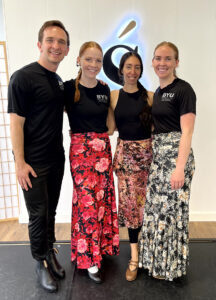
We’re happy to announce our participation in the upcoming National Folk Organization Conference in early April, where we will present our captivating Spanish Dance Experience focused on the vibrant Spanish Flamenco dance known as Tangos!
Our presentation will highlight our recent trip to Madrid, where we had the incredible opportunity to learn from professional flamenco dancer Megumi Pietroniro. We’ll share insights from our experiences at a flamenco tablao, a traditional venue for flamenco performances, our meeting with a Spanish seamstress, and discuss how this immersive environment deepened our understanding of the dance and how it encouraged our respect for the Spanish culture.
Come and join us for a presentation and short, interactive workshop where we will discover the beauties surrounding Spanish Flamenco.
Jillian Iverson, a South Jordan, Utah native and BYU dance major, is a passionate percussive footwork enthusiast with a deep love for cultural dance. Fluent in Spanish and inspired by her 1.5 years living in Spain, she thrives on teaching and exploring diverse dance traditions from around the world.
Levi Hancock, a senior studying physics at Brigham Young University, currently serves as the president of the university’s International Folk Dance Club. His passion for Spanish, cultivated during his time living in southern Argentina, combined with his experience as a member of BYU’s International Folk Dance Ensemble, inspired his interest in pursuing Spanish flamenco dance.
Clara Smilanick, originally from Roseville, California, is a senior at BYU, majoring in Social Science Education. Clara has a deep passion for dancing, which grew while studying various cultural dance forms during her time in college. Her love for percussive tap footwork led her to explore and appreciate the intricate rhythms of Spanish Flamenco, among other cultural dance styles.
Gigi Jensen
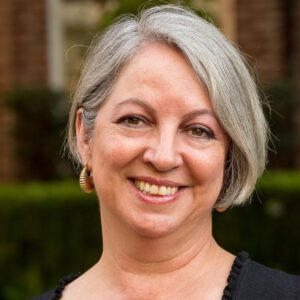
Patricia “Gigi” Jensen grew up in a family of skilled needlewoman. Knitters, spinners, weavers, embroiderers, tatters, and more, made beautiful things as a normal part of their lives. As such, Gigi learned knitting at age 7, helped her mother at the loom by age 10, and sewed her own clothes in high school. Now, she spends the majority of her crafting time as a quilter, knitter, and paper crafter. Yet, there are so many more things to learn! She welcomes the chance to share and learn within the folk community.
Gigi is an accomplished dancer. She loves to dance Argentine tango and folk dance, as well as other social partner dances. Gigi is on the team of Dancing with Friends, a virtual folk dance class. She is one of the founders of the NFO’s Mentoring Project which supports folk dance mentors and mentees. She was on the faculty of Stockton Folk Dance Camp 2012, 2013, and 2019. She has taught and performed in various Latin American countries and the US. She is also a published dance author.
Süssefüsse Performing Group
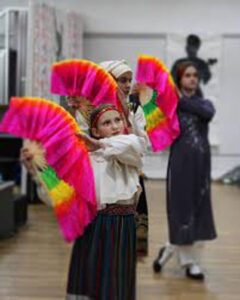
Süssefüsse is a recreational performing group from Portland, Oregon, under the direction of Heidi Vorst. Dancers range in age from 8 to 18. The group has been in existence for 40 years and 18-24 youth participate each year. The mixed ages have always danced together, and they are successful because they enjoy each other.
Dancers often come into the troupe and stay for many years, performing at local festivals and community events. The troupe has shared their love of int’l dance and culture with kings, queens, children, farm workers, retirement communities and more. Dancers are from numerous schools in the Portland area and rehearse weekly with Heidi. Older dancers have the option of an extra session monthly, with some of those dancers now teaching each other.
Kathleen Ash-Milby
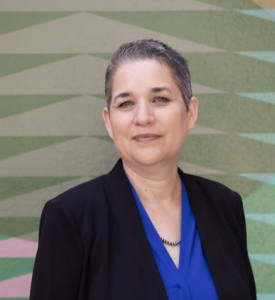
Kathleen Ash-Milby is Curator of Native American Art at the Portland Art Museum, where since 2019 she has expanded the Museum’s engagement with Indigenous artists. In 2024, she served as a commissioner and curator for Jeffrey Gibson’s exhibition for the U.S. Pavilion at the 60th International Art Exhibition of La Biennale di Venezia, the space in which to place me. Ash-Milby spent 19 years at the Smithsonian National Museum of the American Indian in New York. She organized numerous solo and thematic group exhibitions of Native art across a range of media including Dakota Modern: The Art of Oscar Howe (2022); Transformer: Native Art in Light and Sound (2021); and Kay WalkingStick: An American Artist (2015). Previously she was curator and co-director of the American Indian Community House Gallery in New York City, a community-based non-profit devoted to the exhibition of Indigenous and Native American artists in the United States. She is a member of the Navajo Nation.
For her presentation, Ash-Milby will discuss the Jingle Dress Dance, including its origins as a ceremony of healing and its use in contemporary Native American art as a symbol of community and futurity. She will share an excerpt of Jeffrey Gibson’s video installation, She Never Dances Alone (2020), featuring award-winning Jingle Dancer, Sarah Ortegon HighWalking, and speak about the use of dance at the 2024 U.S. Pavilion.
Tulehoidjad Estonian Folk Dance Troupe
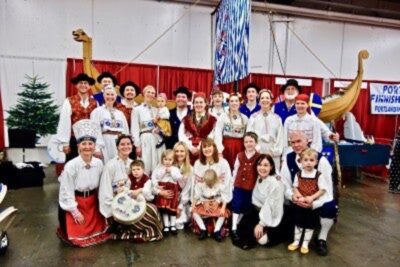
Tulehoidjad, an Estonian folk dance troupe, has kept Estonian folk dances alive in the Portland region for four generations. Liina Teose has been the director since 1985. Teose, who learned to play the accordion at the age of 12, also serves as the group’s accompanist. Her husband plays the guitar. They perform a wide range of Estonian dances including circle, line, and partner dances such as waltzes, polkas, and contra-style dances. Some dances are intergenerational and include children as young as three. Keeping Estonian traditions alive and teaching Americans about Estonian folk dance are the primary aims of Tulehoidjad rahvatantsijad (folk dancers.) It performs in many folk festivals held in the Northwest, including the Portland Rose Festival, the Portland Scan Fair, the Portland Midsummer Scandinavian Festival, and Seattle Folk Life Festival.
